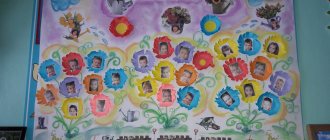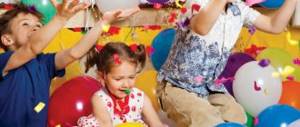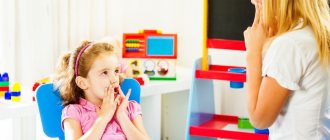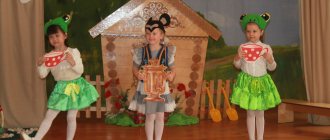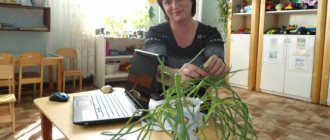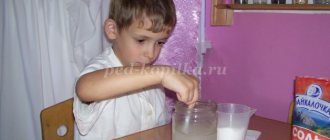Joint project of a kindergarten with a family reading library “Together with a book I grow”
Information Support:
— Photo report for parents (once a month in the reception area of the preschool educational institution);
— information stands (based on the results of visiting the library);
— multimedia presentations (based on the results of events);
- photo collages.
Expected Results
1. Increasing the interest of children and parents in fiction.
2. Revival of the tradition of home reading.
3. Generalization and dissemination of family education experience in introducing children to fiction.
4. Increasing the competence of family members in raising a literate reader.
Logistics support.
MDOU kindergarten No. 42:
The educational subject environment of the kindergarten is equipped taking into account the age characteristics of children.
There is a teaching room, a music room, a gym, a sports ground, areas for children to walk, and group rooms equipped taking into account the age characteristics of children.
A music library of classical and modern music, a stereo system, audio equipment, and a laptop have been selected.
Family reading library:
Reading room, room for general events.
A music library of classical and modern music, a stereo system, audio equipment, a laptop, and constantly changing exhibitions of books for children have been selected.
Final provisions
Joint work on the project of artistic and aesthetic education of children “Together with a book I grow” can be extended if successfully completed with a change in the work plan for subsequent years.
AGREEMENT
about cooperation
Komsomolsk-on-Amur
August 30, 2020
A cooperation agreement was concluded between the MDOU kindergarten of a general developmental type with priority implementation of activities for the artistic and aesthetic development of children No. 42 in Komsomolsk-on-Amur (hereinafter MDOU) represented by the head of Elizaveta Viktorovna Romanova, acting on the basis of the Charter, on the one hand, and MUK State Central Library City Library for Family Reading named after. N. Ostrovsky division No. 6 of Komsomolsk-on-Amur (hereinafter referred to as the Library) represented by the head of Tikhovskaya Lyubov Vasilievna, on the other hand, about the following:
General provisions:
1. 1. This agreement regulates the rights and obligations of the MDOU and the Library and is binding on the parties.
1.2. The parties act on the basis of the Law of the Russian Federation “On Education”.
1.3. This agreement is concluded for the purpose of:
— cooperation in the field of cognitive, speech, social, personal, artistic and aesthetic development of the child;
— organizing joint events;
— interaction with parents of students (use of a book subscription, mobile library).
Project "Family Reading Library"
Inna Dmitrievna Shcherbakova
Project "Family Reading Library"
Objective of the project:
revival of family reading traditions and development of a culture of reading with a child through cooperation with his family.
Project objectives:
1. Introduce children and parents to book culture, educate literate readers.
2. To increase the efficiency of introducing children to books in the interaction of all participants in the educational process: teachers, children, parents.
3. Contribute to maintaining family reading traditions.
4. Improve the style of partnerships with families, cultural and public organizations that promote children’s interest in fiction.
5. Foster a caring attitude towards the book as the result of the work of many people.
6. To help parents realize the value of family reading as an effective means of education and upbringing of preschoolers, an intellectual resource for their personal development, as a guarantee of their success in life.
Relevance:
In modern society, the role of television, computers and other technical means is increasing, both in the lives of parents and their children. Therefore, at present, communication between parents and children is being diminished, and the traditions of family reading books are becoming a thing of the past.
As you know, modern children increasingly spend their time playing computer games, watching TV shows and reading books less and less. But, precisely, the process of communication between a preschool child and a book is the process of developing a personality in him.
A book should enter a child’s world as early as possible, enrich this world, make it interesting, full of extraordinary discoveries. A child should love a book and reach for it. It is a book that is a source of knowledge, development and understanding of the world for a child; reading helps a child to assimilate material, develop speech, memory, and thinking. It is necessary to develop a child’s need for reading as a source of further development.
In conditions when entire electronic libraries are being created, it is difficult to force a child to pick up a book, especially a preschooler, since he is a kind of reader. The word “reader” in relation to preschool age is conditional. In reality, it is the listener whose encounter with the book is entirely determined by the adult, from the choice of text to read to the duration of the interaction with the book. Taste, interest in a work, its interpretation, the ability to navigate the circle of children's reading, the creation of a reading system - all this is in the power of an adult. It largely depends on the adult whether the child will become a real, enthusiastic reader, or whether a meeting with a book in preschool will be a random, meaningless episode in his life. The attitude a child develops towards the process of reading and towards literature also depends on the attitudes of the adult.
That is why today the problem of reviving the traditions of family reading is relevant. Family reading traditions are a very important part of the family education system. Family reading is not just a way to get information, it is the most important and best way of communication and unobtrusive education, which is the most effective. By reviving the tradition of family reading, we are thereby working to create a reading and thinking family. Reading together brings adults and children together, stimulates and fills rare and joyful moments of spiritual communication with content, and cultivates a kind and loving heart in a child. Therefore, family reading should become an important part of everyday life and part of the culture of every family.
Project implementation plan:
Parent survey “The place of books in our family”
Creation of a “Book for Rent” family reading library in group locker rooms with the participation of parents.
Design of a consultation corner for parents on family reading issues.
Exhibition of drawings jointly with parents “My favorite fairy-tale hero”
Recommendations for parents “What should preschoolers read?”
Recommendations for parents “How to instill an interest in reading in children?”
Visit of parents with children of senior preschool age to the library. Creating a reader's subscription for your child
(for senior and preparatory groups).
Consultation for parents “The role of family reading in developing a child’s interest in reading”
Parents’ design of newspapers and collages “Mom, Dad, Me – a reading family”
Excursion to the library. (for senior and preparatory groups).
Family competition “Do-it-yourself baby books.”
Consultation for parents “The role of books in the life of a preschooler”
Exhibitions of drawings and crafts of fairy-tale characters by children and parents based on works read at home.
Literary quiz or holiday for parents and children.
Presentation for children “How a book gets to us.” Book repair in a group by children with parents (for senior and preparatory groups).
Introducing children to literary works, children's writers and poets.
Conversations with children about books read at home.
Factors in the significance of reading with parents
Interest in the revival of family reading in the children's library has recently been increasing. Reading is considered as a developmental medium. Its significance has its own factors:
- Since childhood, children are told fairy tales, read short Bible stories, then myths, poems about nature and animals. This is the most ancient and proven way of educating a person even before he learns the alphabet. Reading activity and culture are formed through listening and speaking.
- Such reading helps to deepen children's attention and develop a need for books. If such a need is instilled in a child from childhood, then he will read a lot in adulthood.
- Family reading events in the library are the key to early and correct mastery of native speech. Early reading helps children grow into communicative people. After all, children’s passive speech (silence) needs to be developed.
- Based on books, an emotional and aesthetic perception of the world is formed. Sounding words have a strong influence on children, they teach them to triumph, rejoice, be sad, grieve, joke, laugh. Words give children vivid, emotional impressions.
- As a result of joint reading, the ability to perceive artistic images develops. Children use their imagination and visual representations. They learn to rejoice and grieve along with literary heroes.
- Reading aloud is beneficial not only for children, but also for older people. It is important not just to listen, but also to perceive and retell what you read. For older people, such activities help them cope with loneliness more easily and pass on their experience to their children. Adults can also observe the spiritual development of children in this way.
- Reading together in the library helps socialize the younger generation. The ground is created for the exchange of opinions, emotional enrichment occurs.
- Such activities serve to prevent aging and stimulate active mental activity.
It is not for nothing that the library is considered to be a territory for family reading. It is an alternative to all types of book study. This practice was actively introduced by the family reading library of Lomonosov (a town near St. Petersburg). The qualified staff of this library provide every possible assistance to families in choosing books. There are many events for this family program here: various local history competitions, literary readings, classes of the Yunta teenage club.
Tasks of joint readings
A targeted program for the development of a family reading library can be focused on the following tasks:
- study the information needs of readers, analyze and develop relevant topics for information;
- to guide elders towards joint communication with the child during the reading process;
- promote friendship between adults and children with books, achieve their mutual understanding;
- improve pedagogical education, psychological and methodological preparedness of parents;
- develop in children the ability to think independently after reading;
- help children and parents look at reading as a means of interpersonal communication;
- develop the creative abilities of the younger generation;
- coordinate activities with schools and teachers;
- use all active bibliographic forms and working methods;
- explore and implement best library practices.
The importance of family reading in the school library
Let's talk about the benefits. But first, let's find out what it is - family reading in the library? Activities of a continuous psychological and pedagogical process of joint reading by children and parents, followed by analysis and discussion - this is the concept of family reading. Analysis of works can be oral, written, or playful. Similar events were held back in the days of the Egyptian pharaohs. Researchers found one record on papyrus from that period, where a father’s appeal to his son was written, asking him to direct his heart to books.
During antiquity, family reading was also widely practiced. One of the Roman rulers himself wrote the History of Rome and studied it with his son. This practice was used both in the Middle Ages and during the Enlightenment. In the 19th century, reading at home was common among noble families. Modern practice already combines home reading with library reading. Professional librarians invite their parents, grandparents, brothers and sisters along with their children. A whole family reading program in the library is being developed. What is it for?
Recently, the role of reading in society has been lost, the prestige of education and knowledge is falling, and young people are focusing on non-book forms of culture. And general cultural, aesthetic, and emotional needs are drawn from books. The literacy rate of young people is falling every year, and the level of necessary reading and writing skills is also declining. Most children have not developed an awareness of the value and significance of books, newspapers, magazines, and electronic information. Therefore, reading in a family environment plays a special role. Reading a story or story together and discussing it makes family members closer and unites them spiritually. Unfortunately, fewer and fewer families are acquiring home libraries. Thus, parents who do not read raise illiterate children. It is possible to improve children's reading only in tandem with school, library and family.
Along with business, normative, educational, entertaining, and self-educational reading, family reading occupies a special place. During this process, the child acquires various skills and abilities and acquires the basis of a reading culture. After all, the family is the first and main intermediary between the book and the child. There, interest in the book is formed, and the reader's taste develops. In Russia, the work of a family reading library has deep roots. It includes a comprehensive program, various forms of work with children and their parents. It’s not for nothing that the library’s family reading program is often called “Warm Home.”
The family is considered a social value all over the world. Family relationships shape a person's personality. Employees of rural and township libraries know many families well and try to influence their relationships through books. They become social educators and organizers of family reading in the library. This is also possible in the school library. The motto of such an integrated approach to the study of books can be taken: “Let's create a country of readers!”


